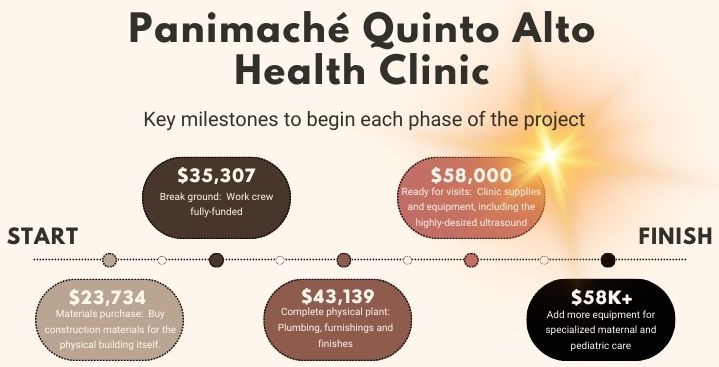Improving Health in Panimaché Quinto Alto
Building a new clinic in partnership with a community
Building a Clinic — and a Healthier Future for All
The Panimaché Quinto Alto (PQA) community’s medical needs are currently assessed in a once-a-month visit in a large open community meeting space. There’s no privacy, exam rooms, or equipment other than what the medical team can carry to the site. The lack of privacy means many women don’t address current or ongoing medical needs, leading to poor health outcomes for both women and their children. For many, easily treatable diseases or infirmities aren’t addressed and become more serious over time. Traveling teams of medical professionals (doctors, dentists, specialists) cannot provide care in PQA due to the lack of appropriate workspace.
A new clinic provides better health outcomes — and expands care
At the request of PQA, we will build a clinic that provides privacy, exam space, equipment, and a permanent space for visiting medical teams to work and expand the community’s care opportunities. The clinic will also provide a comfortable and clean space for the local midwives to consult with their patients and deliver babies.
An exam table, lighting, and basic medical equipment will radically enhance the comfort and safety of their work; that equipment and more are built into the project budget. An ambulance pad is also in our plan, allowing for emergency vehicles to safely and quickly load and unload patients. Also included is an ultrasound machine, which is critical to many diagnoses and assessments. This unit will be shared with neighboring communities as needed. A storage space will allow for ongoing access to vitamins, fortified rice, and other supplies to combat malnutrition in the community.
We will break ground as soon as we reach full funding for construction, completing the clinic in 23 weeks. Our goal is to complete funding and build and equip the clinic before February 2025.
TOTAL BUDGET: $58,000
FAQ
Construction, materials, and finish materials: $40,059*
- Foreman: $6,240
- Crew (paid): $4,800
- Leveling of ground: $400
- Construction materials: $23,334
- Materials delivery: $533
- Cement mixer rental: $240
- Windows: $1,533
- Doors: $1,201
- Sink and mirror: $445
- Shower: $933
- Toilet: $400
Medical equipment: $3,340*
- Exam tables (2): $360 each
- Tabletop baby scale: $80
- Hanging toddler scale: $168
- Adult digital scale: $240
- Glucometer (2): $76 each
- Stethoscopes (2): $312 each
- Stadiometers (2/adult): $232 each
- Stadiometers (child): $214
- Oximeter (2): $59 each
- Infrared thermometer (2): $67 each
- Surgical masks: $93
- Examination gloves: $75
- First aid kit (2): $70 each
- Stitch removal kit (2): $40 each
- Cleaning and hygiene supplies: $72
Specialized medical equipment: $11,333*
- Ultrasound machine
Furniture: $2,360*
- Staff desks and chairs: $640
- File cabinets for medical records: $667
- Medicine storage: $933
- Waiting area chairs: $120
*Estimated costs are based pricing at the time of budget construction (December 2023)
When you click DONATE NOW, a series of fields will be displayed to collect your name and email address. There is a “Comment” space where you can note the intentions behind your donation, including any memorial/honorary designation or application to any specific item or area in our budget.
Included in our budget is professional labor; we have a trusted team of foremen and construction workers, creating jobs in Guatemala while providing us with the local expertise to complete our jobs at a high-quality level. Additional labor is non-paid and volunteered by the beneficiary community (PQA). This arrangement is mutually beneficial because it keeps our project costs more manageable and shows we value the community and their skills. It also instills ownership and pride for the recipients as they share the workload and responsibility. We recognize the partnership and work on completing goals together.
The clinic will be made of concrete block construction and have a full concrete roof, allowing for potential future expansion and a second level. Ample and suitable electricity will be installed and appropriate plumbing for the required sanitation needs. There will be two examination rooms, a reception and waiting area, a storage and supplies closet, and a sanitation room with toilet, sink, and shower. It will have plentiful windows for natural light, doors on both examination rooms for privacy, and a sturdy outer door with a lock for safeguarding the medicines and other supplies stored inside. (Please see the architectural drawing here.)


 The “right” opportunity arose when I learned about a travel opportunity for adoptive families which would include volunteer work and cultural sightseeing. Being members of that team had a profound impact on me, Lillian and Andrew. Not only were we able to make a real connection to our son’s birthplace, but we met incredibly warm and generous people, all of whom we now consider to be a part of our “family.” In addition to the volunteer work I shared with the Team, I also was able to “give back” by performing as my alter ego, “Farfel the Clown” at a barbecue for children of The Backyard School. It will remain one the proudest and happiest memories of my life.
The “right” opportunity arose when I learned about a travel opportunity for adoptive families which would include volunteer work and cultural sightseeing. Being members of that team had a profound impact on me, Lillian and Andrew. Not only were we able to make a real connection to our son’s birthplace, but we met incredibly warm and generous people, all of whom we now consider to be a part of our “family.” In addition to the volunteer work I shared with the Team, I also was able to “give back” by performing as my alter ego, “Farfel the Clown” at a barbecue for children of The Backyard School. It will remain one the proudest and happiest memories of my life.